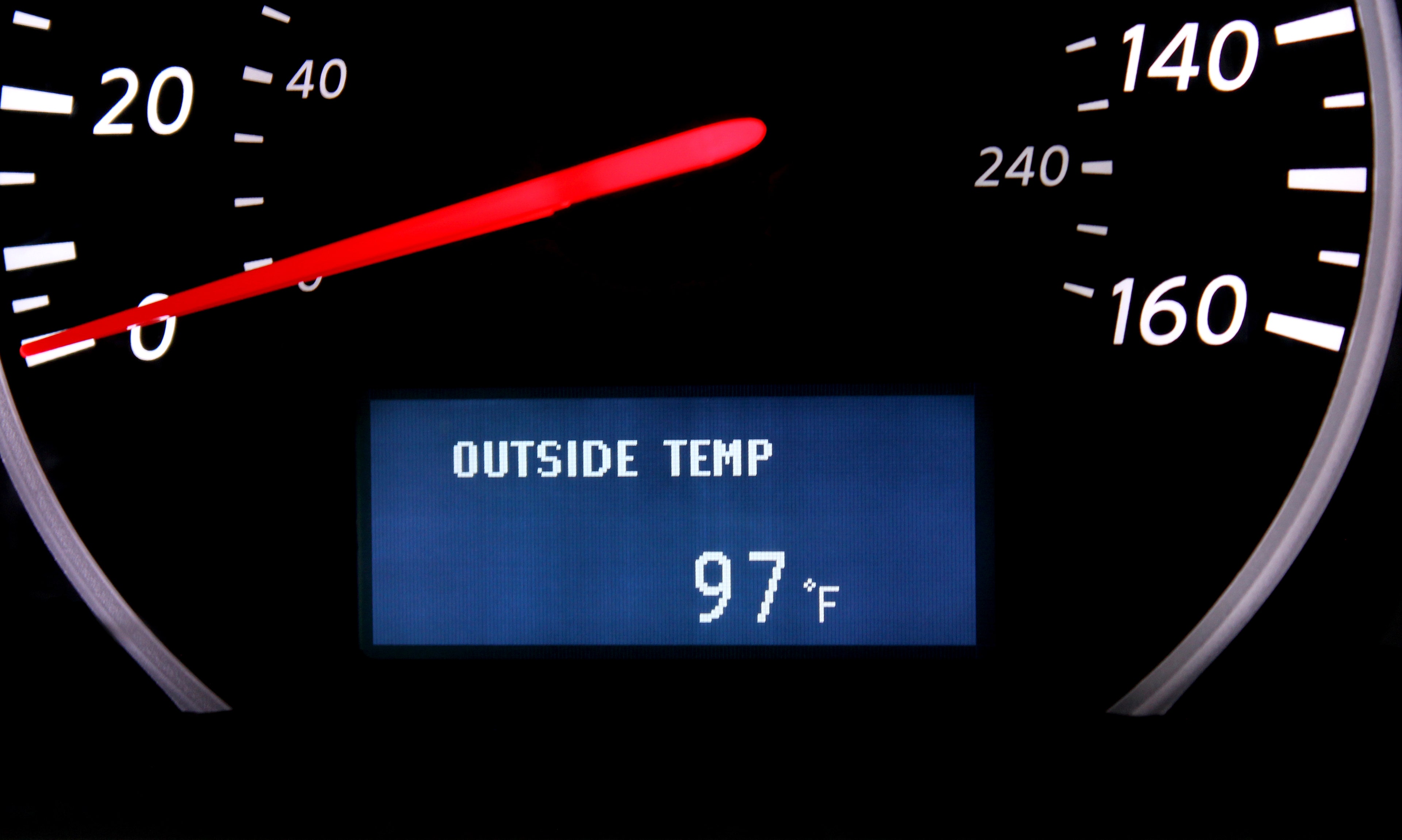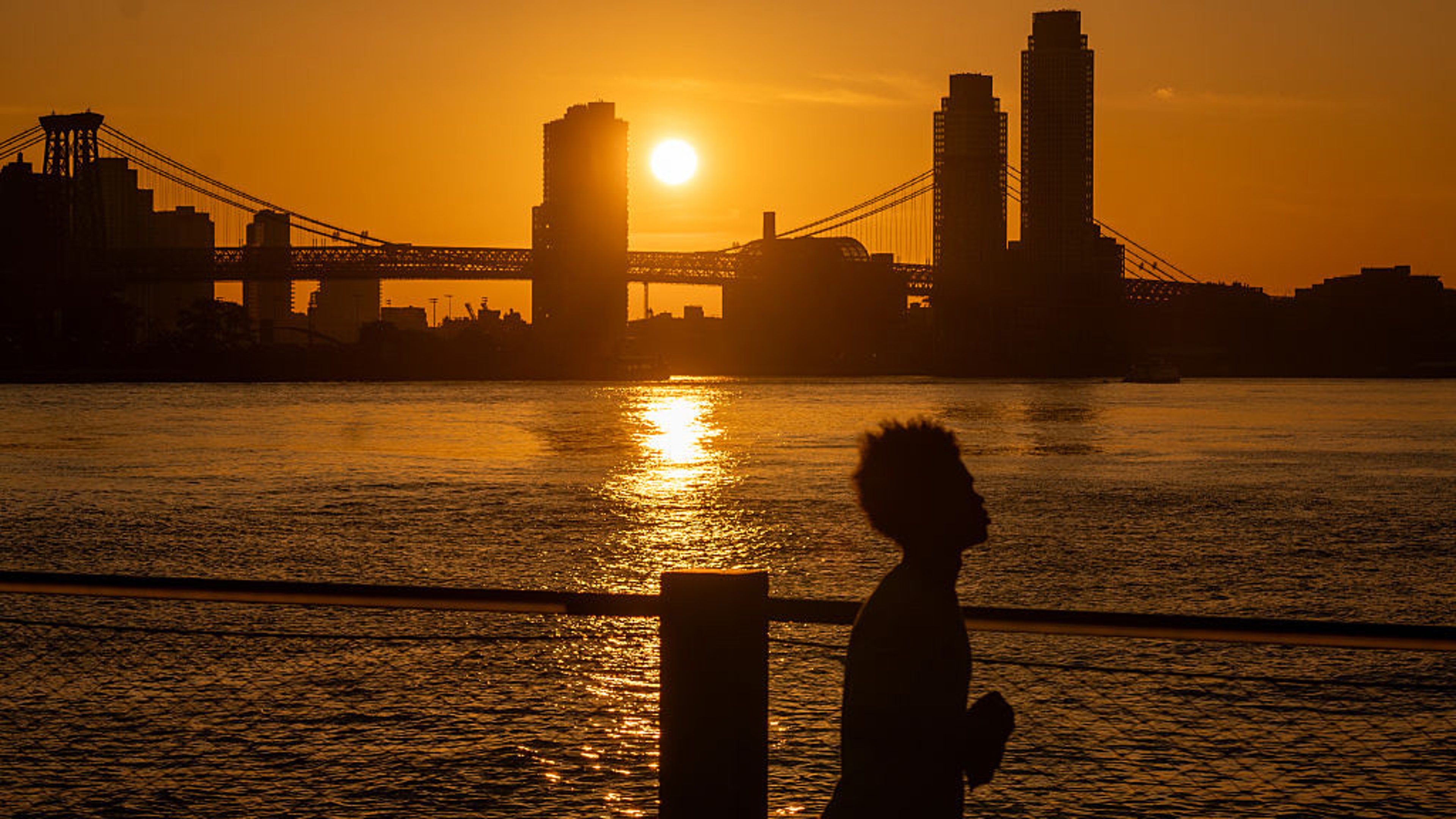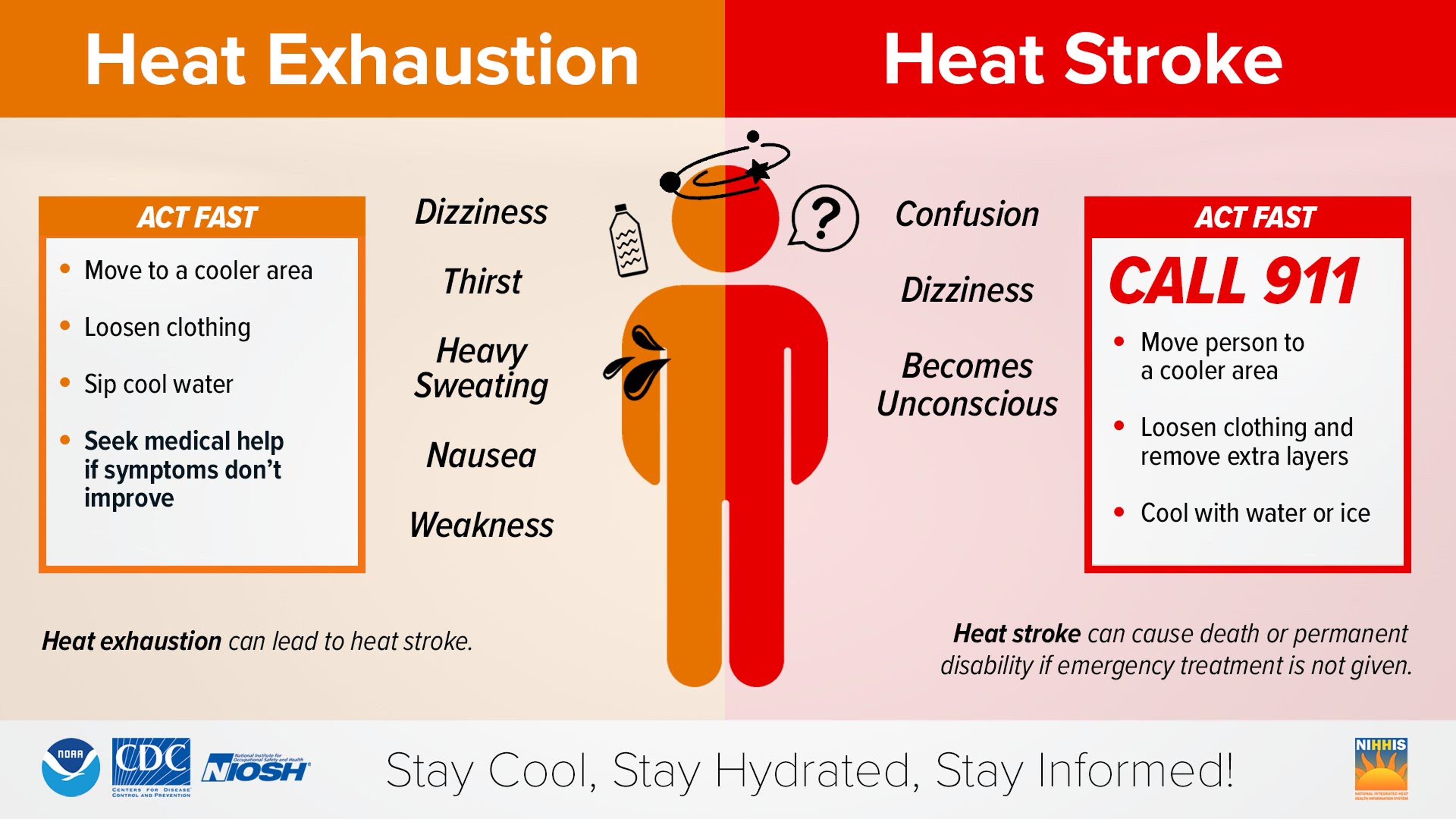Extreme Heat Peaks Tuesday; Some Relief Wednesday
Tens of millions across the Midwest and Northeast are baking under a brutal heat wave, with actual temperatures—not just the “feels like”—soaring past 100°F. At least one heat-related death has been confirmed as several cities shatter records, power grids strain and outages spread.
How are you handling the heat? Text us at (404) 793-7182 and tell us your name and where you live. We may include your answer in our live updates below:
(12:48 p.m. EDT) What Is A Heat Dome?
They go by names like “heat dome” or “death ridge,” and they’re no exaggeration—these massive zones of high pressure can stretch for 1,000 miles and cook the U.S. under skies that refuse to rain.
Here’s how a heat dome works: As sinking air compresses and heats up, triple-digit temperatures start to scorch the land, thunderstorms vanish, and a vicious cycle of heat and drought locks in for days (or even weeks).
These deadly weather patterns are silent killers, responsible for hundreds of U.S. deaths each year.
For a more in-depth look at heat domes, check out our explainer here.
(12:37 p.m. EDT) Extreme Heat In The Nation’s Capital
The Washington Monument will be closed Tuesday and Wednesday due to extreme heat in the Washington, D.C. area, according to the National Park Service. Heat indices in the area are expected to hover around 110 degrees.

Working before the temperature hits 100 degrees today, Jeffrey Adcock cleans the reflecting pool in Lower Senate Park.
(AP Photo/J. Scott Applewhite)
(12:27 p.m. EDT) First Death From Heat Wave Confirmed In Missouri
Sadly, this heat wave has turned deadly. Authorities in St. Ann, Missouri, announced the death of a 55-year-old woman who passed away Monday after going at least three days without water or air conditioning. She has not been identified yet.
St. Ann is located in the northwestern suburbs of St. Louis, not far from Lambert International Airport. Temperatures at the airport soared to 96 degrees on Monday.
(12:18 p.m. EDT) Mental Health Tips To Navigate The Heat Wave
Feeling more anxious, tired or irritable in the heat? Well it’s not just your imagination. Studies show that extreme heat can impact your mental health by increasing cortisol – the stress hormone. But the good news is – there are ways to be mindful to help you stay cool, calm and collected. Learn how to best support your mental health during the heat wave here.
(12:08 p.m. EDT) Northeast Communities Baking With No Cooling Infrastructure
From content meteorologist Sara Tonks:
Temperatures in Casco Bay off the coast of Maine have already reached the low 90s with heat indices in the triple digits – a lot of the houses out on the islands (and many on the mainland) do not have central air conditioning because of historically comfortable temperatures for the summer. For small island communities with little infrastructure, that can mean there are very few (if any) reliable ways to cool off.
 (11:45 a.m. EDT) Take Advantage Of Cooling Centers
(11:45 a.m. EDT) Take Advantage Of Cooling Centers
Chicago is one of several cities reminding residents to beat the heat by taking advantage of cooling centers today. The city’s Office of Emergency Management & Communications posted a list of locations on social media.
Check sites like Facebook, X and Instagram to see if local officials have tips for your area.
(11:37 a.m. EDT) Your Vehicles Are Likely Lying To You
From senior meteorologist Jonathan Belles:
We’ve seen all your car thermometer pictures with temperatures over 100 degrees. But did you know, most of them are likely wrong? And that they aren’t even thermometers?
Car thermistors have a couple of flaws. First, they are placed behind a metal grill in a giant metal object – our cars – and, secondly, they are most likely located above black pavement or blacktops. That means that the reading on your car is likely much too warm because darker objects and metal objects both retain heat more than a grassy area.

automobile temperature gauge hot summer
(Getty Images)
You’ve probably noticed this as you’ve rolled down the road away from where your car was sitting. Temperatures often drop as your car moves away from the heat that your car had been baking in.
The thermometers we use have mercury that expands as temperatures rise. A thermistor, on the other hand, measures the change in electrical current as a result of heat added or removed. Both are generally accurate, but must be placed in unbiased locations to read temperatures accurately.
(11:16 a.m. EDT) The Heat Indices In These Cities Might Not Sound Real (But They Are)
Our Jon Erdman did a quick round-up of what temperatures are feeling like in a few cities, and what he found around 11 a.m. ET may make you sweat just thinking about it:
- Downtown Manhattan Heliport: 110˚
- Farmville, Virginia: 114˚
- Clinton, North Carolina: 117˚
- Edenton, North Carolina: 121˚ (Temp: 94˚, dew point: 84˚)
We have a map of current heat indices here.
(11:01 a.m. EDT) A Record High Before Lunchtime
From senior meteorologist Chris Dolce:
Providence, Rhode Island, hit 95 degrees just before 11 a.m. ET, which set a daily record. The old record was 94 degrees set on this day in 1980. Boston was just one degree away from its daily record of 95 degrees at the same time.
(10:55 a.m. EDT) Climate Change’s Role
According to Climate Central’s Climate Shift Index, the severity of this heat wave in the East has been made 3-5 times more likely due to climate change.
You can see how climate change is also affecting other areas of heat around the world in their interactive map.
(10:47 a.m. EDT) Car Goes Flying As Extreme Heat Buckles Road
(Albert Blackwell via Storyful)
A driver in Cape Girardeau, Missouri, got the worst kind of surprise as the heat broke open the road. The car went airborne as the asphalt split open and jutted into the air. The driver did not appear to be hurt, but it wasn’t the only road that buckled in the city. See the full video here.
(10:37 a.m. EDT) Seasonal Allergies Spike In Hot Weather
Don’t trust that sneeze – the heat could trigger a full-blown allergy attack thanks to hot and humid temperatures affecting pollen counts. So why does a climbing thermometer mean aggravated allergies?
Hotter temperatures mean longer growing seasons, and more growth means more pollen in the air. But it’s not just more pollen – it’s more potent, which means even the same amount of pollen can trigger a stronger allergic reaction.
Add in humidity and high heat, and you’ll have mold spores growing before you know it. If you don’t already have a dehumidifier, check out our guide on how to pick the right dehumidifier for your home.
Hot weather goes hand-in-hand with poor air quality thanks to environmental pollutants. No matter how well sealed your windows and doors are, there’s going to be just enough leakage into your home that sensitive noses will get the sniffles. If you’re looking to improve your indoor air quality, check out our beginner’s guide to air purifiers and how they work.
So how can you keep those allergies tamed during a heat wave spike? Try to stay indoors as much as possible, with pollen levels the highest in morning and early evening. Shower after you’ve been outside, since pollen is sticky, and wear the proper warm weather attire (including sun shirts, hats and sunglasses).
(10:16 a.m. EDT) New England Records Threatened
The thermometer at Boston’s Logan Airport is already reading 93 degrees as Boston and much of New England endure another punishing day of heat. Excessive Heat Warnings and Air Quality Alerts are in effect through much of the region.
Today’s extreme heat could challenge June record highs from Logan (where the previous June record is 100 degrees, first set in 1925 and matched in 1952 and 2021) to Connecticut’s Bradley airport (where the June record is also 100 degrees, set in 1952 and tied in 1964).
We’ll be keeping a close eye on that Logan Airport thermometer to see if the monthly record gets beaten.
According to senior digital meteorologist Jonathan Erdman, “our forecast for Logan Airport is now 102 degrees, which would easily top their June record, but would also be their hottest single day since July 22, 2011, almost 14 years ago.”
(10:03 a.m. EDT) Residents In The Carolinas Asked To Conserve Energy
Duke Energy is encouraging its customers in North and South Carolina to reduce the amount of energy they use during peak demand hours this evening. They’re hoping the appeal will lessen the potential of power outages. According to PowerOutage.us, thousands of customers in Pennsylvania, New York, Georgia and New Jersey are without power as temperatures surge into the 90s. Some of the outages are lingering from storms late last week and over the weekend.
(09:51 a.m. EDT) When Is It Safe To Walk My Dog?
In these soaring temperatures, it’s not always safe to have your furry friend outside. In fact, it can be downright dangerous to take your dog for a midday walk on steamy asphalt with no hydration breaks.
Luckily, the American Humane Society has offered up some helpful tips for how to keep your pet safe in these brutal conditions. Did you know about the shoulder pinch trick? Learn more about that and all kinds of other safety tips here.
(09:35 a.m. EDT) Some Will Have Relief Today
The sun rises over Manhattan on what is expected to be the hottest day of the year on June 24, 2025 in New York City.
(Spencer Platt/Getty Images))
Today will be the peak of the heat wave in the Northeast. But our Jon Erdman says some will feel relief as soon as today, and in the next two days.
The post below highlights who will see the heat wave back off in the next few days.
(09:24 a.m. EDT) Flipping The Script On This Heat With Some Record Cold
While the East has been under a heat dome of high pressure, Chris Dolce points out that the Northern Rockies have seen the opposite with a southward plunge of the jet stream bringing chilly air and several record lows to the region.
Billings and Miles City, Montana, both set daily record low temperatures Monday by dropping to 41 degrees. Even colder was Casper, Wyoming, which fell to a daily record of 32 degrees, or right at the freezing mark.
(09:06 a.m. EDT) It’s That Hot Already?!
Some of the temperatures recorded just before 9 a.m. ET may make you do a double take:
Boston Logan: 90
Atlantic City: 91
Philadelphia: 91
Newark: 93
For a more complete look at just how hot it could get, check out our forecast here.
(08:57 a.m. EDT) Desert Heat + Humidity
Our senior digital meteorologist Jon Erdman notes that Monday’s high in Burlington, Vermont was 99, their hottest day in almost 24 years, and it equaled the high in both Tucson and Yuma, Arizona.
Today’s forecast high in Boston (102 degrees) is about the same as Phoenix (103 degrees). But it’s with oppressive humidity, not the “dry heat” of the Desert Southwest.
(08:32 a.m. EDT) Heat-Related Illness: The Signs To Watch For And How To React
An important reminder from our Caitlin Kaiser:
Extreme heat is the number one weather-related killer. Our bodies have a difficult time cooling down when exposed to extreme heat, leaving us vulnerable to heat-related illnesses. As we see another day of dangerous temperatures across much of the eastern half of the country, it’s important to know the symptoms of heat-related illness and how to properly respond.

A list of warning signs and symptoms of heat illness and recommended first aid steps from the CDC and NWS.
(08:27 a.m. EDT) Watching Central Park
Yesterday, Manhattan’s Central Park tied a record high for the date of 96 degrees. The last time it was that hot in the park was on June 23, 1888, or 137 years ago.
With New Yorkers facing what is forecast to be their worst day of the heat wave, we’ll be watching the temperature in Central Park closely. If it breaks 100, it would be the first time the park has seen 100 degrees or higher since 2012, and the first time such high temperatures have occurred in June since 1966.
(08:08 a.m. EDT) Trains Slowed For Safety In D.C.
Washington, D.C.’s metro rail transportation is telling passengers to plan on additional travel time in the midst of this heat wave. That’s because speeds have to run slower on above-ground track sections for safety reasons as the heat can expand the rails the trains travel along.
(07:58 a.m. EDT) Rip Current Risk Today
From weather.com meteorologist Jennifer Gray: For those in the New York City area seeking relief from the heat at the beaches, there’s a moderate risk of rip currents today. Make sure you swim near a lifeguard and know how to spot a rip current.
(07:55 a.m. EDT) Amtrak Train Gets Stuck In Baltimore Tunnel Without Power
Passengers on Amtrak train heading to Boston were stranded for more than an hour on Monday without power and air conditioning in sweltering temperatures. Amtrak said a “locomotive malfunction” stopped the train in a tunnel shortly after it left Baltimore Penn Station. Passengers were eventually evacuated and put on other trains.
(07:35 a.m. EDT) All-Time Warmest Low Tie In New York City?
From weather.com senior meteorologist Chris Dolce:
New York City’s low temperature so far this morning is a balmy 81 degrees. That would tie an all-time warmest low temperature in records dating to 1869 for the month of June. That assumes they won’t slip below the current record of 81 degrees set June 26, 1952, before midnight tonight.
